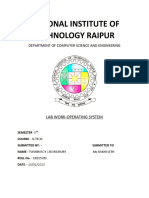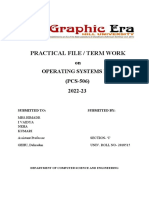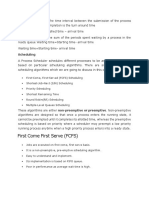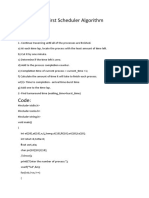0% found this document useful (0 votes)
4 views18 pages24cse099 Arsh
The document contains a series of experiments related to operating systems, including basic Linux commands and various scheduling algorithms such as First Come First Serve, Shortest Job First, Non-Preemptive Priority, and Round Robin. Each experiment outlines objectives, provides code examples, and explains the functionality of the algorithms. Additionally, it includes sample outputs for the programs demonstrating their execution.
Uploaded by
anumaancsCopyright
© © All Rights Reserved
We take content rights seriously. If you suspect this is your content, claim it here.
Available Formats
Download as PDF, TXT or read online on Scribd
0% found this document useful (0 votes)
4 views18 pages24cse099 Arsh
The document contains a series of experiments related to operating systems, including basic Linux commands and various scheduling algorithms such as First Come First Serve, Shortest Job First, Non-Preemptive Priority, and Round Robin. Each experiment outlines objectives, provides code examples, and explains the functionality of the algorithms. Additionally, it includes sample outputs for the programs demonstrating their execution.
Uploaded by
anumaancsCopyright
© © All Rights Reserved
We take content rights seriously. If you suspect this is your content, claim it here.
Available Formats
Download as PDF, TXT or read online on Scribd
/ 18
























































































